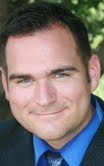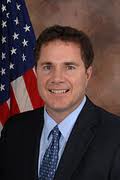
by | May 8, 2013
 (The following is a guest piece from Polk County GOP Co-Chair Chad Brown)
(The following is a guest piece from Polk County GOP Co-Chair Chad Brown)
The political season in Iowa never ends, and the county leadership of Iowa’s 3rd Congressional District is on the move to organize. The harder we work to organize the counties, both Iowa’s 3rd Congressional District and RPI will grow in strength. Some of my activist friends have wanted an explanation of the District Executive Committees, so I wrote this explanation to detail their role.
District Executive Committees have traditionally been a vital ingredient to the success of the Republican Party in Iowa. Their important role is detailed in the RPI Constitution. Traditionally, the Republican Party is built as a grass roots Party that was always strong because it had a firm foundation and was built from the ground up. Unfortunately, the District Executive Committees were deactivated within recent years and that vacuum was filled by powerful single issue groups that dominated the leadership selection process by preventing Republican County leaders from talking to each other and promoting leadership from the grass roots. We want to restore the grass roots to the Republican Party and include more people. This is why people used to refer to the G.O.P. as The Big Tent.
It’s unfortunate that these long-standing Committees were deactivated and silenced, but the new counties’ executive leadership in the 3rd Congressional District are getting back to basics! We are here to improve and unify the Republican Party and get more people involved. The executive leadership of the county-level central committees of the Republican Party of Iowa located within the Third Federal Congressional District of the State of Iowa have called for its first official meeting to be held on May 7 to discuss and consider certain specific matters.
This is an exciting time as we begin to restore an important tradition of grass roots to the Republican Party in Iowa.
Chad Brown, Polk County GOP Co-Chair and 3rd Congressional District Executive Committee ————————————————————————————————-
Article VII, paragraph 1 of the RPI Constitution states:
Article VII District Executive Committees
1. The District Executive Committee shall consist of the Chair and Co-Chair of each County in the Congressional District plus one additional representative for every fifty thousand (50,000) population in that County based on the most recent federal census. The additional County representative sh…all be elected by the County Central Committee.
2. The District Committee shall: (1) direct and coordinate Republican activities in the district, including organizational, candidate recruitment, and finance efforts; (2) coordinate the congressional and legislative campaigns in the district for the duly selected Republican nominees; (3) perform all of the duties relating to any election to fill a district vacancy on the Republican State Central Committee; (4) advise the congressional district’s representatives on the Republican State Central Committee; and (5) do all other things which serve to promote the welfare of the Republican Party and the orderly and successful conduct of the election campaign in the congressional district.

by | Apr 10, 2013
 Though it will fall short of the intense attention we receive during Presidential years, November 2014 in Iowa will develop into a fierce battleground for both political parties. In spite of the gubernatorial election on the ballot the prize for each side will be the open US Senate seat vacated by Tom Harkin.
Though it will fall short of the intense attention we receive during Presidential years, November 2014 in Iowa will develop into a fierce battleground for both political parties. In spite of the gubernatorial election on the ballot the prize for each side will be the open US Senate seat vacated by Tom Harkin.
While it is a virtual certainty that Bruce Braley will be the Democrat candidate in this race the Republican field is wide open, with no one yet confirming a run. As it stands now Rep. Steve King has been given the “first right of refusal†by fellow potential candidates Kim Reynolds and Bill Northey, and it is widely believed he will have decided by May 1st. One way or another, the field will become clear soon after. In the meantime, here is a first look at the dynamics if the matchup were King vs. Braley.
The Numbers
On last weekend’s Iowa Press Steve King referred to a Republican winning the seat as a “slightly uphill battleâ€â€”and the numbers indeed bear this out. Though they were highly inflated due to it being a Presidential election year, the cumulative votes cast last year in Iowa’s four Congressional districts reveal the Republican will be starting in an electoral hole. In total the four Congressional Democratic candidates (Braley, Loebsack, Boswell, and Vilsack) received 772,387 votes, while the four Republican candidates (Lange, Archer, Latham, and King) received 726,505 votes (D+45,882).
Obviously this is too broad a measure to be definitive but it does give a feel for the obstacles the Republican will face. Far more informative is looking at how Braley and King faired in their individual races. In this scenario the candidate and the electorate in their districts remain the same and the only variable that changes is the opponent. What the numbers show is that Bruce Braley is a better performing candidate than Steve King—something that will likely come as a surprise to many Republicans.
Last cycle Braley went in with a 25,420 voter registration advantage in HD 1 over Ben Lange but won by 59,957—beating the numbers by 34,537. Meanwhile King went in with a 50,396 voter registration advantage in HD 4 over Christie Vilsack but won by only 30,593 votes—losing the numbers by 19,803.
Yes Braley and Vilsack’s numbers were surely inflated due to Obama being on the ballot, and King and Lange were done no favors by Romney’s trouble with Independents, but there is still cause for concern. This is due to the fact that some of this inflated total was surely offset by King facing a far weaker opponent than Braley—Lange was a proven campaigner who came within 4,000 votes of beating Braley in 2010 while Vilsack proved to be an awful candidate who ran a terrible campaign.
These facts are certainly not to suggest a Republican cannot win the seat, they merely offer some context on the difficulties involved and likely explain the caution potential candidates are proceeding with.
Braley vs. King on Paper
The perplexing thing about this potential matchup is that on paper King is a far superior candidate to Braley. While King started an earth moving construction company from scratch, Braley is a trial lawyer and former head of the Iowa Trial Lawyers Association. Though it is true King has a visceral way of approaching issues and a knack for the ill-worded statement, Braley’s voting record reveals he is without a doubt a west-coast Liberal who just happens to reside in Iowa. In fact, besides voting with Democrats and Obama’s agenda 98% of the time in 2008, 99% in 2009, and 98% in 2010, since January 2007 he has voted 91% of the time with Nancy Pelosi. Among these votes of course are Cap & Trade, Dodd-Frank, Obamacare, and authorizing more than $6 trillion in debt over the last four years.
The number one objective for the campaign of whatever Republican takes on Braley will be getting the word out on his voting record. And if the above facts aren’t enough evidence of his poor decision making for Independents in Iowa—you can add he was one of the first to endorse fellow trial lawyer John Edwards for president in 2008.
My Take
In many Republican circles it has become a common belief that Steve King can’t win a statewide race—I do not concur. Perhaps I’d see more truth in this if the candidate on the other side was a moderate instead of one of the most Liberal politicians in the country—funny how we never hear Bruce Braley can’t win a statewide race.
That being said, I am of the belief that our strongest candidate by a longshot would be Kim Reynolds—and we would not risk a House seat in the process. While he would surely have a shot if he ran, undoubtedly the media would exclusively focus on King’s past statements and ignore Braley’s voting record.
In the end I predict that King will decide against running. Whether he proves me wrong or not, whoever takes up this task will have to run hard. Though this is a realistic opportunity for Republicans the numbers show that it indeed will be a “slightly uphill battleâ€.

 (The following is a guest piece from Polk County GOP Co-Chair Chad Brown)
(The following is a guest piece from Polk County GOP Co-Chair Chad Brown)
